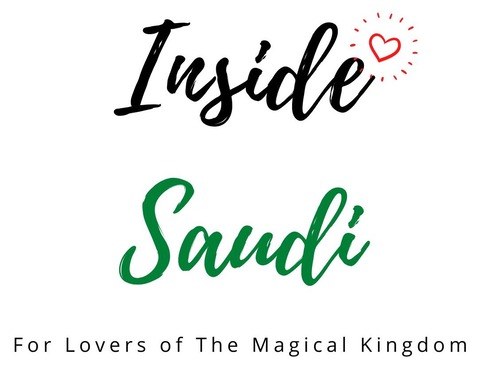I have lived in and travelled to many countries in the Muslim world. By far the most important day for Muslims in any of these countries is Eid Al Adha or what is known as the Feast of the Sacrifice.
I often wondered why it is that on Eid day especially, (Islamic month 10th of Duhul Al Hijah), millions of sheep including cows, camels and goats are ritualistically slaughtered. So, I decided to do a bit of research to find out.
So why do Muslims slaughter sheep (Udhiya) on the day of Eid Al Adha? The day of the Greater Eid Festival (Eid Al Adha) marks the end of the Hajj or the annual Islamic pilgrimage to Mecca in Saudi Arabia. Muslims worldwide celebrate this day in remembrance of Prophet Ibrahim’s (Abraham) willingness to slaughter his own son, Ismael before Allah intervened and ordered him to kill a sheep instead. Ibrahim had seen the slaughter of his son Ismael in a dream.
Click the link  to see read and hear this event in the Quran.
to see read and hear this event in the Quran.
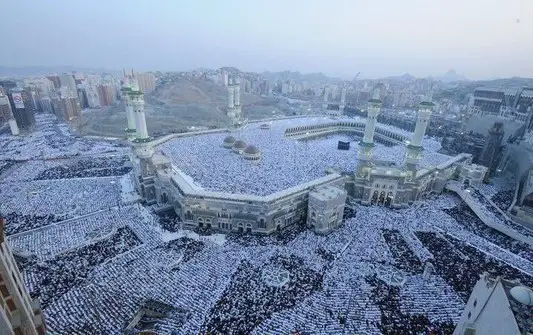
Eid Al Adha-A Day of Feasting and Fun
On the morning of Eid Al Adha, millions of Muslims across the world wake up early, dress in their best and go out with their families to pray Salat Al Eid or the Eid Prayer.
They do this in a congregation in large numbers and not always in the mosque, but usually out on an open area specially prepared for the event.
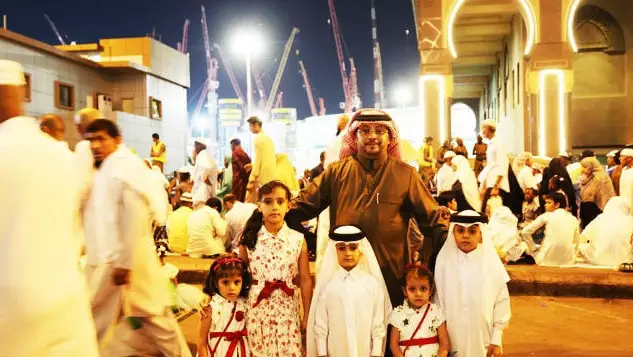
After the Eid prayer has ended, Muslims slaughter an animal often times a sheep but also cows, goats and camels are popular too.
The Slaughter in Mina, Saudi Arabia
Each year, more than a million cows and sheep (Hadi) and (Udhiya) are slaughtered the day following Hajj under strictly controlled conditions and operated by 400 employees of the Adahi Project in Mina near Mecca.
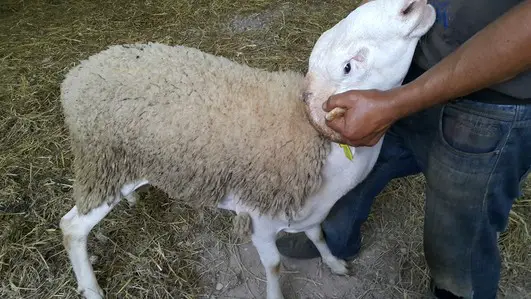
In Mina, sick and unfit animals are excluded and more than 800 vets and doctors are on hand to ensure clean and proper conditions for the sacrifice and for carcass disposal.
The meat is then sent out to more than 25 countries including Jordan, Palestine, Syria and Iraq as well as countries in Africa and Asia such as Mali, Ghana, Senegal, Bangladesh and Azerbaijan.
At the Adahi Project website, Muslims can buy a sheep or a cow online. A sheep is 490 SR and a cow is 3, 325 SR. Click this link t o see how to buy a sheep or a cow online.
o see how to buy a sheep or a cow online.
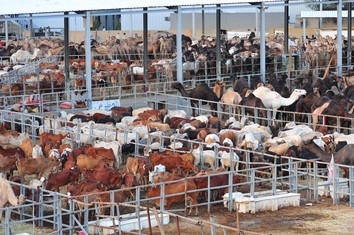
You can go there to slaughter the animal yourself or have a butcher and veterinarian (for control) slaughter it for you. The meat is later distributed to the needy.
Slaughter in Normal Towns and Cities
In most Muslim countries, the ritual slaughter is conducted in slaughterhouses, in back yards, rooftops, gardens and in the streets. For public convenience, the slaughterhouses are conveniently located close to the sheep/animal market.
Click the link to see the full slaughter of sheep in Morocco.
to see the full slaughter of sheep in Morocco.
When Muslims buy their sheep from the animal market, they take it by vehicle to the slaughterhouse, buy a coupon and present the sheep or animal at one door, wait for up to an hour depending on the number of animals and then collect the large cuts of meat in a large plastic bag from another door.
In Saudi Arabia, going inside slaughterhouses is not always permitted though people often do go inside to watch the process.
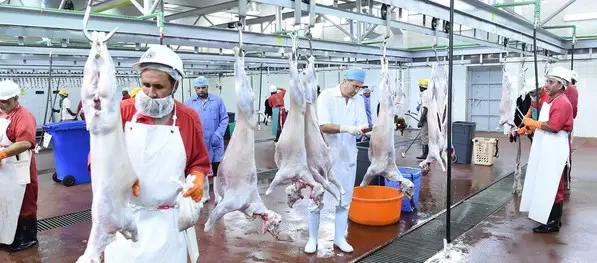
The Conveyor Belt Slaughter Process
At the slaughterhouse (maslah), the unsavoury process of slaughter and dressing the animal is conducted in a kind of production line.
First, one team of butchers slaughter the animal. Then, it is conveyed on a moving chain to another who strips then the carcass. Another team disembowels it, until finally another chops and prepares the limbs and body for bagging.
The process is quick, easy and convenient. It costs about 30-50 SR.
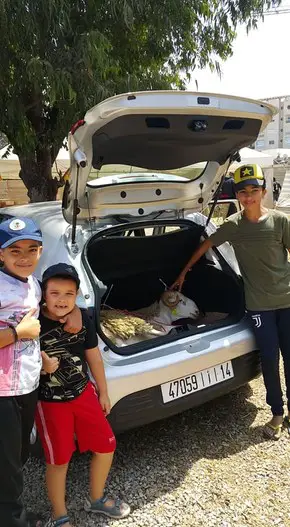
Most people, however, bring butchers or experienced slaughterers to their houses and pay them about 100-150 SR to do the job. Or if you want, you can do it yourself. MFS
I have slaughtered sheep on many occasions and over time have learned how to cut and dress a carcass myself.
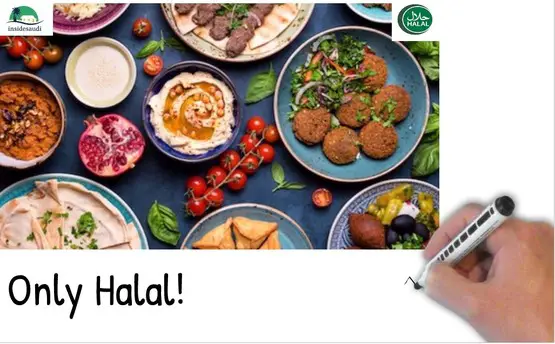
What does Halal mean and how is Islamic slaughter Halal?
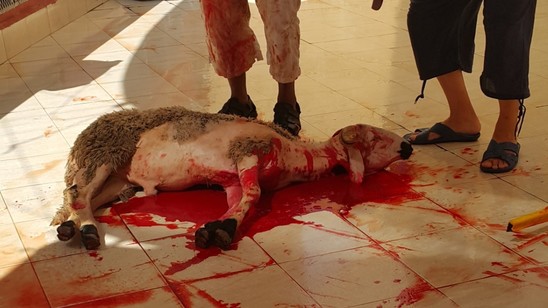
Halal means something lawful or permissible. The opposite is called Haram, which is something unlawful or not permissible.
When applied to food, it means a standard or a law which accords with either the injunctions in the Holy Quran or Islamic sharia Law.
All foods are considered Halal, except those that are prohibited for consumption under the sharia law.
They are usually foods that contain components that have pork and/or related products. There are more. See below!
For the slaughter of an animal to be considered Halal, certain conditions must be met. The one doing the slaughter must be an adult and sane.
He/she first should position the animal to face Mecca, then pronounce Bismillah, Allahuma Hatha Minka wah Lak, Allah or In the Name of Allah. This is from and to you, Allah, before making a cut.
The knife should be very sharp and the cut made across the throat in one swooping motion and it should be made strong enough to sever the trachea, oesophagus, the jugular vein and blood vessels.
Some slaughterers like to cut and sever the head from the neck completely.
It is important that the animal does not suffer, that it does not see the knife nor the other animals being slaughtered.
After the cut, the animal will fall unconscious within a few seconds and will die because of cerebral hypoxia and not blood loss.
Thankfully (alhamdulillah), the animal does not suffer at all. After the throat is cut, the blood must be left to completely drain out of the body and the animal should surely die before it is gutted and divided.
Why do Muslims eat Halal food?
Of course, Muslims will always prefer Halal foods to non Halal foods. There are a number of reasons. The first and most important is that in eating Halal foods, Muslims are obeying the creator Allah, Almighty and following the sharia law.
Second, there are a number of health benefits to eating Halal prepared foods. Halal reared animals are clean and safe to eat.
They are usually left to graze and eat naturally. No antibiotics and growth hormones are used in the treatment that can stay in the animal carcasses and get passed onto the consumer to stay in our bodies and make us sick.

Also, since the blood is allowed to drain out of the slaughtered animal, the meat stays free of bacterial contamination.
The blood that in a non-halal slaughtering process stays in the meat, putrifies it and causes it to go off quickly. Halal meat is blood-free and tastes so much better than non-halal meat.
Animals left to graze without human interference using harmful and foreign chemicals are healthier, have natural antioxidants, vitamins, CLA and 50% more omega 3 fats than non-grazing varieties. MFS
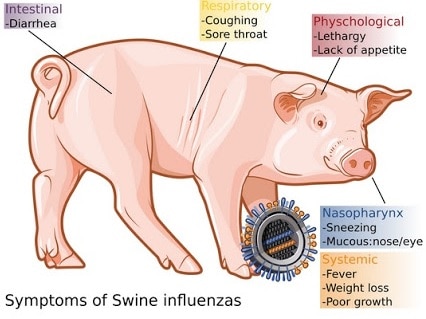
Why are Pork and its related products considered as Haram or impermissible?
As Muslims, we cannot eat such foods. This is because of an injunction in the Quran which prohibits it:
He has only forbidden to you dead animals, blood, the flesh of swine, and that which has been dedicated to other than Allah . But whoever is forced [by necessity], neither desiring [it] nor transgressing [its limit], there is no sin upon him. Indeed, Allah is Forgiving and Merciful.
Chapter Al Baqarah, 2:173
Click the link  to see read and hear this verse in the Holy Quran.
to see read and hear this verse in the Holy Quran.
The reasons are not given in the Quran. However, we do know that pigs eat anything, have diseases and worms that can get into the human body.
Even if the meat is cooked to a high temperature, the eggs of the worms cannot easily be killed. Once the eggs are introduced into the human body, then they hatch and infect us.
Also, pig fat is notoriously difficult to digest in the human body. The chances are that the more pig fat you eat the more it will be stored on and around the body. Eat too much pig and sadly you become pig-like.
Muslims often say that pigs have no jealousy and that a male pig will allow another to come and mate with his partner.
By eating pork, they argue that the many undesirable qualities of the pig get transferred to the human being.
Finally, pigs today are raised in poor conditions and the quality of the meat obtained is not very good nor is it especially healthy.
The following verse from the Holy Quran clearly outlines what is Haram in forms of meat:
Prohibited to you are dead animals, blood, the flesh of swine, and that which has been dedicated to other than Allah, and [those animals] killed by strangling or by a violent blow or by a head-long fall or by the goring of horns, and those from which a wild animal has eaten, except what you [are able to] slaughter [before its death], and those which are sacrificed on stone altars, and [prohibited is] that you seek decision through divining arrows. That is grave disobedience. This day those who disbelieve have despaired of [defeating] your religion; so fear them not, but fear Me. This day I have perfected for you your religion and completed My favor upon you and have approved for you Islam as religion. But whoever is forced by severe hunger with no inclination to sin – then indeed, Allah is Forgiving and Merciful.
Chapter Al Maaidah 5, Verse 3.
Click the link  to see read and hear this verse in the Holy Quran.
to see read and hear this verse in the Holy Quran.
Finally, in Islam, all Haram foods are permissible Halal if you are starving or experiencing severe hunger. See the last three lines of the above verse for proof.
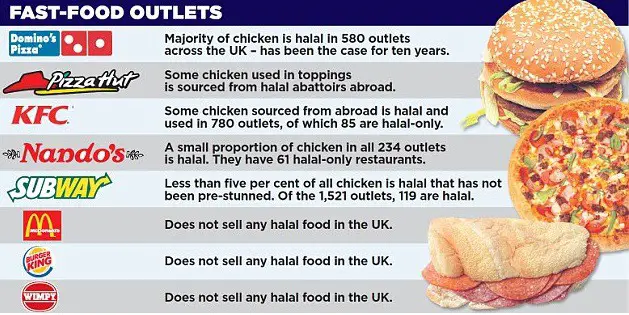
Buying Halal Foods
One of the most amazing benefits of living in a Muslim country is that all the foods you buy in supermarkets and shops etc. are Halal.
There is no need to worry or think too much about the origin of the food products and if it is permissible for Muslims to eat them.
However, when I visit Western, non-Muslim countries, the problem becomes apparent. Except in the major towns and cities, Halal foods are not always available.
While it is easy to avoid buying pork meat, it is not always easy to avoid pork products or non-halal products that are used a lot as food additives.
For example, on our last visit to the UK travelling about the country, I ate only salads, cheese pizza and fish.
Most processed food in supermarkets in that country contain non-halal fats such as gelatine in sweets, non-halal rennets in dairy products, non-halal shortening in biscuits and cakes etc. making buying and eating food quite a problem since we were mostly eating out.
Related Questions
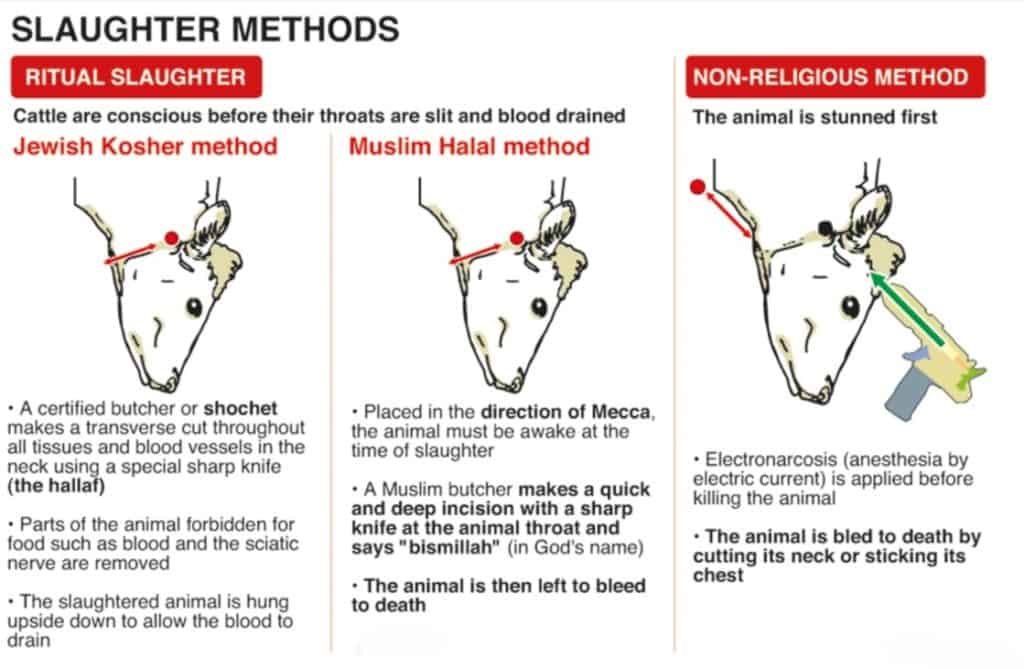
Is Kosher and Halal meat the same? There are similarities and differences. Similarities: Pork is prohibited outright by Jews and Muslims. Fish is permissible for both, but only with scales for Jews. Halal gelatin is permissible by both. All insects are prohibited for both, except some locusts or grasshoppers. Finally, the method of slaughter is very similar.
Differences: Alcohol, though not permitted at all in Islam, can be consumed if it is natural and in small quantities for Jews. In Judaism, camels are forbidden. Animals for consumption must be cloven-hooved and chew the cud. Meat and dairy should not touch each other nor the utensils used for both. All raw foods MUST be washed together with the hands before and after preparation. MFS
Other than pork, what other foods are Haram or prohibited for Muslims? Alcohol, blood, carrion, (i.e. roadkill), beaten, strangled, fallen animals killed by any prey or if the name of Allah is not pronounced over it or hunted animals caught during Hajj, except fish.
